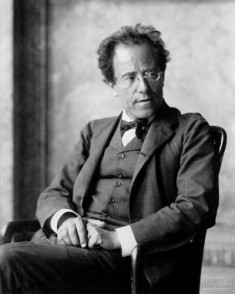| Gustav Mahler | |
|---|---|
 |
|
| Composer | |
| Born | July 7, 1860 |
| Died | May 18, 1911 |
| Nationality | Austrian |
Gustav Mahler was a Romantic Austrian composer and a leading conductor of his generation. As a composer, Gustav acted as a bridge between 19th century Austro-German tradition and modernism of early 20th century. In his lifetime, his status as a conductor was established beyond recognition. His music gained wide popularity after a period of relative neglect that included a ban on its performance in Europe during the Nazi era.
Early Life
Gustav was born on July 7, 1860. His family came from eastern Bohemia and they were of very humble circumstances. His grandmother, in fact, was a street peddler. In December of 1860, the family moved to the town of Iglau, which was a commercial town of about 20,000 people. Here his father built up a distillery and tavern business.
The family grew very fast, but only six out of the 12 children survived. Gustav was introduced to music through street songs, folk melodies, dance tunes, trumpet calls and marches of the local military band. All of these contributed to his mature musical vocabulary.
When Gustav turned four years old, he discovered his grandmother’s piano and took it to use it. This is how he began developing his great performing skills. He even gave the first public performance at town theatre when he was 10 years old. Although he loved music, his school reports showed he was absent-minded and unreliable in his academic work.
In 1874, he suffered a major blow when his brother died after a long illness. Gustav Mahler decided to express his feelings in music. With the help of a friend – Josef Steiner – he started working on an opera entitled Duke Ernest of Swabia.
Getting a Musical Education
Gustav received a lot of support for music career from his father. He encouraged him to try for a place at the Vienna Conservatory. Gustav auditioned and was accepted for the period between 1875 and 1876. As a piano student, he made great progress and won prizes at the end of his first two years.
For his final year at the conservatory, he concentrated on composing and harmony under Franz Krenn and Robert Fuchs. Few of his compositions survived during this time, mainly because he abandoned most of them after he became dissatisfied with them.
At the conservatory, Mahler met Hugo Wolf and they formed a very close friendship. However, Hugo was later expelled from conservatory. In 1878, Gustav Mahler left the conservatory with a diploma. He later enrolled at the University of Vienna where he began to develop an interest in German philosophy. He was even introduced to Siegfried Lipiner and other great thinkers during this time. All these thinkers continued to influence Gustav and his music long after he stopped studying.
Mahler’s Early Career
During the summer of 1880, Gustav took his first professional conducting job. He took this job in a small wooden theatre in Bad Hall, which is just south of Linz. In 1881, he was engaged at Landesthateater in Laibach. Here, he conducted his very first full-scale opera. He also presented more than 50 operas during his time in Laibach. After the end of his six-month engagement, Gustav returned to Vienna and worked part-time as a chorus-master at Vienna Carltheater.
Time in Prague and Leipzig
In 1885, Gustav was offered a job as an assistant conductor at Neues Deutshes Theater in Prague. While in Prague, he was given a task to help stop the decline of the theater’s fortunes by giving high-quality productions of German opera. In 1886, he left Prague to Leipzig where he was offered a position as Neues Stadttheater.
Mahler as a Composer
 In 1888, Gustav composed his First Symphony and in 1892, he composed his Second Symphony. He completed his Third Symphony in 1896. During this time, he was busy conducting orchestras and operas for companies in Kassel in 1883, Prague in 1885, Leipzig in 1886, Budapest in 1888, Hamburg in 1891 and Vienna 1894.
In 1888, Gustav composed his First Symphony and in 1892, he composed his Second Symphony. He completed his Third Symphony in 1896. During this time, he was busy conducting orchestras and operas for companies in Kassel in 1883, Prague in 1885, Leipzig in 1886, Budapest in 1888, Hamburg in 1891 and Vienna 1894.
In 1901, he composed his Fourth Symphony and therefore completed what many historians say wraps up his early symphonies. Gustav’s Fifth, Sixth, and Seventh Symphonies were composed in the years 1903, 1904, and 1905. All of these were strictly orchestral.
His final works included Das Lied der Erde in 1908, Ninth Symphony in 1909, and his Tenth Symphony in 1911, which he never finished.
Death
During the winter season of 1911, Gustav Mahler’s heart condition (he had been diagnosed four years earlier), worsened. He traveled back home to Austria to spend his final days next to his family. On May 18, 1911, Gustav passed away.